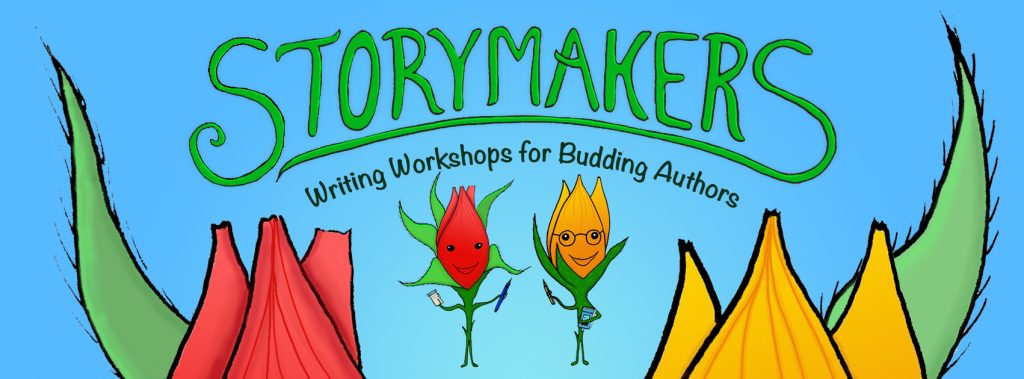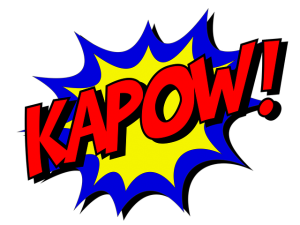Why is creative writing important for children?
Writing is inextricably linked to all forms of creativity from art to drama, so why shouldn’t children enjoy writing as much as they do these other disciplines?
I am a firm believer that fostering a love of stories in children will help them enjoy reading and that reading regularly encourages a love and appreciation of stories, which in turn can lead to enjoyment of writing and creating stories of their own.
Like I said, they are all linked to one another.

This is why I created my own children’s writing club – Storymakers. I have reluctant readers of my own, so I’ve worked hard and I’m still working at ways to help them realise the power of the written word in the hope they’ll seek it out through books.
I also don’t want them to feel daunted by writing tasks or see them as a chore
Children have amazing imaginations and all they need is a little guidance to harness those wonderful ideas and turn them into something special, forever treasured. It should be a fun process, focusing on all aspects of creativity to help them see how story making links to other forms of art.
UPDATE: TO LEARN MORE ABOUT THE STORYMAKERS CREATIVE WRITING CLUB FOR KIDS, PLEASE REFER TO THE WEBSITE: http://www.storymakersclub.com. HERE, YOU WILL FIND DETAILS OF WEEKLY GROUPS, AS WELL AS HOLIDAY WORKSHOPS.
ALL WORKSHOPS, GROUPS AND ONE-TO-ONE LESSONS WILL BE AVAILABLE VIRUTALLY.
In one of my workshops, we look at where ideas come from and we learn about using all of the senses to search for ideas. By focusing on one sense at a time, the children gain an understanding of what it takes to hone in on just one aspect, shutting all others out. Not only does this help them tune in to their surroundings through all their senses, it also helps with descriptive writing, to broaden it from the default of writing only what you might see.
Learning to write isn’t always about putting words onto paper.
A piece of music can tell a story – think of Peter and the Wolf, or Danse Macabre. The words of a song may also tell a story – if you listen carefully, you will hear it. Acting out a scene can bring it to life and help you understand the workings of dialogue. It can also help you to see how body language is important and how you might describe it in your writing.
I have plans to introduce new workshops to add to my current list.
I’ve already added my first picture book workshop, where we will look at the art of saying so much but in so few words. Picture books have powerful images to help tell the story, but the words must bring those illustrations to life, flowing through the story in a way that is understandable to the young listener. You don’t have to be an illustrator to write a picture book story. I wrote one a long time ago and I drew my own illustrations to help me lay out the story. They were bad, really amateurish, but I had fun doing them and by the time I had pinned the pages together, I had my own little picture book.
The picture book workshop is happening on September 23rd. You can book your place here.
Another workshop I’m planning is comic strip story writing. Like a picture book, comics rely on images, but these images move the story along each step of the way, in a similar way to a storyboard. Writing a comic examines writing in short form, but also relys heavily on dialogue, not forgetting use of onomatopoeia – ‘kapow’, ‘thwack’ ”crash’.
The great thing about comic strips is you don’t need to be good at drawing, at all. You can also make up the most ridiculous characters – it’s your story after all!

To help with writing dialogue, I plan to offer a workshop based on writing a mini-play. Getting the children to act out what they have written will help them see whether their dialogue actually works. It’s about getting them to think about what people sound like when they speak, so they can create realistic conversations in their writing. We will also act out various emotions, such as sadness, or anger and examine body language and facial expressions. Rather than simply telling the reader the character is sad, for example, the children will be able to show this in their writing.
The aim of the Storymakers workshops is to take a fun and practical approach to writing, in order to harness the creativity that is already present in abundance in children.
For more information, please refer to the Storymakers page of this site.

These sound like such great ideas for getting children reading and writing Nikki. I hope your writing clubs and events have been going well. xx
Yes, so far so good. I’m hoping the new workshops will be well received
I live in Kent Sittingbourne, have been searching with no luck for a writing club for my Son, great ideas I love what I am writing here keep it up Nikki
Thanks for getting in touch, Nwabisa. You’re right, there aren’t many of these clubs, but the children who come to mine seem to enjoy it and it’s proving popular with the parents too!